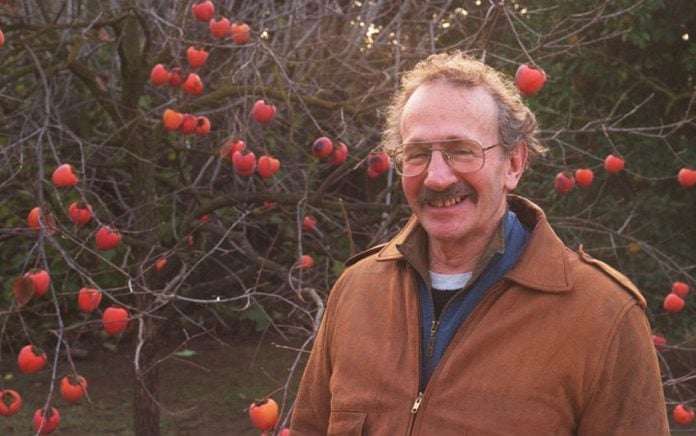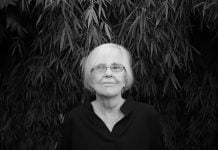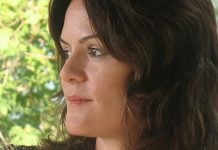Philip Levine (1928-2015) fue un profesor y poeta norteamericano de ascendencia judía nacido en Detroit. Estudió en la Universidad Estatal de Wayne y posteriormente dictó clases durante más de treinta años en la Universidad Estatal de California. Su poesía retrata la clase obrera americana de mediados del siglo XX con un lenguaje coloquial y preciso que oscila entre la representación de la realidad inmediata y la íntima. Entre sus principales libros publicados se encuentran What work is, ganador del National Book Award en 1991, considerado por la crítica uno de los libros de poesía más importantes de nuestro tiempo; The simple truth (1994), merecedor del Premio Pulitzer de Poesía en 1995. Otros de sus títulos son Stranger to nothing: Selected poems (2006) y The last shift (2016), publicado póstumamente. Fue elegido Poeta Laureado de los Estados Unidos en el año 2011. Murió a la edad de 87 años.
Soñando en sueco
La nieve cae sobre los altos y pálidos juncos
cerca de la costa, y aunque en algunos sitios
el cielo es pesado y oscuro, un claro sol
se asoma lanzando su luz amarilla
sobre la superficie de las olas que llegan.
Alguien ha dejado una bicicleta apoyada
contra el tronco de un arbusto y se adentra
en el bosque. Las huellas de un hombre
desaparecen entre los densos pinos y robles,
un hombre lento, de pies grandes, arrastra
su pie derecho en ángulo extraño
mientras marcha a la única cabaña blanca
que envía su columna de humo al cielo.
Debe ser el cartero. Una bolsa de lona,
medio cerrada, se levanta derecha en una caja de madera
sobre la rueda delantera. Los dispersos
cristales de nieve se filtran uno a uno
empañando la dirección de una sola carta,
aquella que escribí en California y envié
a pesar de saber que no llegaría a tiempo.
¿Qué tiene que ver con nosotros esta orilla
cercana a Malmö, y la blanca cabaña
sellada contra el viento, y la nieve
cayendo todo el día sin propósito
o necesidad? Ahí está nuestro saco de lona de respuestas,
si sólo pudiéramos conectar las cartas entre nosotros.
La simple verdad
Compré un dólar y medio de pequeñas patatas rojas
Las llevé a casa, las herví en sus cazuelas
Y las comí en el almuerzo con un poco de sal y mantequilla.
Luego caminé por los áridos campos
al borde del pueblo. A mediados de junio
la luz se agarraba de los oscuros surcos a mis pies,
y en la montaña de robles escuché las aves
reunirse para la noche, los arrendajos y sinsontes
graznaban de aquí para allá, los pinzones aún se precipitaban
a la luz polvorienta. La mujer que me vendió
las patatas era de Polonia; ajena a mi infancia,
vestida con abrigo de lentejuelas y gafas
que alcanzaban la perfección de todas sus frutas y vegetales
situados al borde de la calle, me incitaba a probar
el más crudo, pálido y dulce maíz, traído,
juró, de New Jersey. “Come, come”, dijo ella,
“Aunque no lo hagas diré que lo hiciste”.
Algunas cosas
las sabes toda tu vida. Son tan simples y verdaderas
que deben ser dichas sin elegancia, metro o rima,
deben colocarse sobre la mesa al lado del salero,
del vaso de agua, de la ausencia de luz aglutinándose
en la sombra de los marcos, deben estar
vacías y desnudas, deben valerse por sí solas.
Mi amigo Henri y yo llegamos a esto juntos en 1965
antes que me alejara, antes que él empezara a matarse,
y ambos a traicionar nuestro amor. ¿Puedes saborear
lo que digo? Son cebollas o patatas, una simple
pizca de sal, el exceso de mantequilla derritiéndose
es innegable, se queda detrás de la garganta como una verdad
que nunca se dice porque el momento siempre es inadecuado,
se queda ahí por el resto de nuestras vidas, impronunciable,
hecha de esa suciedad que llamamos tierra, del metal que llamamos sal,
en una forma para la que no tenemos palabras, y así vivimos.
La voz de mi hermana
Medio dormido en mi silla, escucho
una voz temblar en la ventana,
el mismo llanto de miedo que sentí
por vez primera junto al Guadalquivir
cuando me despertó el viento y la lluvia,
cuando llamé a alguien ausente,
y escuché la respuesta. Eso fue en España,
veintiséis años atrás. Su voz,
la de mi hermana, viene de nuevo
a preguntar cómo seguimos sin ella.
Esa noche junto al gran río
me vestí en la oscuridad, solo
dejé a mi familia y caminé congelado hasta
la llegada del atardecer, al borde oriental
de las montañas. No encontré respuesta
o aprendí a no preguntar, porque
el viento responde si uno espera
lo suficiente. Gira en una dirección,
luego en otra, los árboles se tuercen,
se levantan, la vasta hierba se ondula y reverencia,
todas las voces que has escuchado
las escuchas otra vez hasta saber
que nada has escuchado. Así espero,
inmóvil, y mientras se calma el viento
crece silenciosa mi pequeña, perdida
hermana, tímida como en vida.
Recuerdo haber regresado esa noche
en Sevilla, pasados los rieles,
tratando de aferrarme a cada palabra
pronunciada por ella, aunque se escaparan
de mis labios sus palabras. Las máquinas
humearon en el frío. El centinela
de gorra marrón se sacudió
para despertar, y sin fuego,
llanto humano o canto de ave,
el día se quebró sobre todas las cosas.
No pidas nada
En lugar de recorrer solo la noche
saliendo de la ciudad hacia los campos
dormido bajo un cielo oscurecido;
el polvo que levantan tus pasos
se transforma en una dorada lluvia
que cae sobre la tierra como
el regalo de un dios desconocido.
Los sicomoros en la orilla del cauce,
los pocos álamos del valle,
contienen su aliento mientras cruzas el
puente de madera que no te lleva
a ningún lugar en el que hayas estado, pues
este paseo se repite una o más veces al día.
Es por eso que ves en la distancia
más allá de la primera cumbre de colinas bajas
donde nada crece, hombres y mujeres
a horcajadas en mulas, en caballos, algunos
a pie, toda la familia perdida que
nunca rezaste para ver, reza por verte,
salmodiando y cantando para atraer
la luna al último rayo de sol.
Detrás de ti las ventanas del pueblo
parpadean, las casas se cierran;
hacia adelante las voces se disipan como
música en agua profunda y desaparecen;
incluso los veloces, inquietos pinzones se han
convertido en humo, y el único camino blanqueado
en luz de luna conduce a cualquier lugar.
Polvo y memoria
Un hombre pequeño sin afeitar, tal vez en
sus cincuenta, con una gorra arrastrada a un lado
para ocultar sus rasgos. Inclinó su cabeza
hacia el suelo, gimió, se levantó para dejarla caer
en abandono, y arrojó su cuerpo hacia
adelante otra vez. ¿Un suplicante
de rodillas ante qué? ¿Ante el abuso
de la tierra y el mar? ¿Ante el poder del dolor?
¿Ante el rostro de una diosa pintado en la proa
del barco de pesca en cuya sombra se escondió?
Cuando la gorra cayó reconocí un hombre
con el que me cruzaba volviendo a casa cada noche,
un vecino cercano con el que nunca he hablado
ni hablaré. Después del anochecer no me volví
para mirar y encontrarlo ausente o para escuchar
el mar, sin luna, en una palabra
sin consonantes, repetida invisiblemente
dentro de mi cabeza.
¿De qué se trata esto?
Dondequiera que estés ahora hay tierra
en algún lugar debajo de ti esperando tomar
lo poco que dejes. Esta mañana me levanté
antes del amanecer, vestido en el frío, lavé
mi cara, pasé un peine por mi pelo
y sentí mi cráneo debajo, implacable,
pronto el hogar de nada. El viento
que arremolinó la arena ese día años atrás
tuvo un nombre que sobrevivirá al mío
por mil años, aunque hecho de aire,
que es en lo que me convertiré, con suerte,
dice en voz baja a tu oído,
“soy polvo y memoria, tus dos vecinos
en esta estrella fría.” Ese viento, el Levante,
aullará por las cuencas de mi cráneo
para hacer una música peculiar. Cuando la escuches,
recuerda que soy yo, cantando, ausente pero aquí,
cálido aún en el fuego de tu cuidado.
Dreaming in Swedish
The snow is falling on the tall pale reeds
near the seashore, and even though in places
the sky is heavy and dark, a pale sun
peeps through casting its yellow light
across the face of the waves coming in.
Someone has left a bicycle leaning
against the trunk of a sapling and gone
into the woods. The tracks of a man
disappear among the heavy pines and oaks,
a large-footed, slow man dragging
his right foot at an odd angle
as he makes for the one white cottage
that sends its plume of smoke skyward.
He must be the mailman. A canvas bag,
half-closed, sits upright in a wooden box
over the front wheel. The discrete
crystals of snow seep in one at a time
blurring the address of a single letter,
the one I wrote in California and mailed
though I knew it would never arrive on time.
What does this seashore near Malmö
have to do with us, and the white cottage
sealed up against the wind, and the snow
coming down all day without purpose
or need? There is our canvas sack of answers,
if only we could fit the letters to each other.
The simple truth
I bought a dollar and a half’s worth of small red potatoes,
took them home, boiled them in their jackets
and ate them for dinner with a little butter and salt.
Then I walked through the dried fields
on the edge of town. In middle June the light
hung on in the dark furrows at my feet,
and in the mountain oaks overhead the birds
were gathering for the night, the jays and mockers
squawking back and forth, the finches still darting
into the dusty light. The woman who sold me
the potatoes was from Poland; she was someone
out of my childhood in a pink spangled sweater and sunglasses
praising the perfection of all her fruits and vegetables
at the road-side stand and urging me to taste
even the pale, raw sweet corn trucked all the way,
she swore, from New Jersey. “Eat, eat”, she said,
“Even if you don’t I’ll say you did”.
Some things
you know all your life. They are so simple and true
they must be said without elegance, meter and rhyme,
they must be laid on the table beside the salt shaker,
the glass of water, the absence of light gathering
in the shadows of picture frames, they must be
naked and alone, they must stand for themselves.
My friend Henri and I arrived at this together in 1965
before I went away, before he began to kill himself,
and the two of us to betray our love. Can you taste
what I’m saying? It is onions or potatoes, a pinch
of simple salt, the wealth of melting butter, it is obvious,
it stays in the back of your throat like a truth
you never uttered because the time was always wrong,
it stays there for the rest of your life, unspoken,
made of that dirt we call earth, the metal we call salt,
in a form we have no words for, and you live on it.
My sister’s voice
Half asleep in my chair, I hear
a voice quiver the windowpane,
the same high cry of fear I first
heard beside the Guadalquivir
when I wakened to wind and rain
and called out to someone not there
and heard an answer. That was Spain
twenty-six years ago. The voice hers,
my sister’s, and now it’s come again
to ask how we go on without her.
That night beside the great river
I dressed in the dark and alone
left my family and walked till dawn
came, freezing, on the eastern rim
of mountains. I found no answer,
or learned never to ask, for
the wind answers itself if you
wait long enough. It turns one way,
then another, the trees bend, they
rise, the long grasses wave and bow,
all the voices you’ve ever heard
you hear again until you know
you’ve heard nothing. And so I wait
motionless, and as the air calms
my small, lost sister grows quiet,
as shy as she was in her life.
I remember coming back that night
in Sevilla past the rail yards,
trying to hold on to each word
she’d spoken even as the words fled
from my mouth. The switch engines
steamed in the cold. The sentry
in a brown cap sat up to shake
himself awake, and with no fire,
no human cry and no bird song,
the day broke over everything.
Ask for nothing
Instead walk alone in the evening
heading out of town toward the fields
asleep under a darkening sky;
the dust risen from your steps transforms
itself into a golden rain fallen
earthward as a gift from no known god.
The plane trees along the canal bank,
the few valley poplars, hold their breath
as you cross the wooden bridge that leads
nowhere you haven’t been, for this walk
repeats itself once or more a day.
That is why in the distance you see
beyond the first ridge of low hills
where nothing ever grows, men and women
astride mules, on horseback, some even
on foot, all the lost family you
never prayed to see, praying to see you,
chanting and singing to bring the moon
down into the last of the sunlight.
Behind you the windows of the town
blink on and off, the houses close down;
ahead the voices fade like music
over deep water, and then are gone;
even the sudden, tumbling finches
have fled into smoke, and the one road
whitened in moonlight leads everywhere.
Dust and memory
A small unshaven man, perhaps fifty,
with a peaked cap pulled sideways
to hide his features. He bowed his head
to the ground, groaned, rose to thrust
his head back in abandon, and flung
his body forward again. A supplicant
on his knees to what? The earth and sea
that had misused him? The power of pain?
The female God-face painted on the prow
of the fishing boat whose shade he hid in?
When the cap fell away I recognized a man
I passed each evening coming home at dusk,
a near neighbor to whom I’d never spoken
and never would. After dark I did not
steal back to find him gone or to hear
the sea, moonless, itself only a word
without consonants, repeated invisibly
inside my head.
What is this about?
Wherever you are now there is earth
somewhere beneath you waiting to take
the little you leave. This morning I rose
before dawn, dressed in the cold, washed
my face, ran a comb through my hair
and felt my skull underneath, unrelenting,
soon the home of nothing. The wind
that swirled the sand that day years ago
had a name that will outlast mine
by a thousand years, though made of air,
which is what I too shall become, hopefully,
air that says quietly in your ear,
“I’m dust and memory, your two neighbors
on this cold star”. That wind, the Levante,
will howl through the sockets of my skull
to make a peculiar music. When you hear it,
remember it’s me, singing, gone but here,
warm still in the fire of your care.
|
Colabora con nuestro trabajo Somos una asociación civil de carácter no lucrativo, que tiene por objeto principal la promoción y fomento educativo, cultural y artístico. En Rialta nos esforzamos por trabajar con el mayor rigor profesional en la gestión, procesamiento, edición y publicación de los contenidos y la información. Todos nuestros contenidos web son de acceso libre y gratuito. Cualquier contribución es muy valiosa para nuestro futuro. ¿Quieres (y puedes) apoyarnos? Da clic aquí. ¿Tienes otras ideas para ayudarnos? Escríbenos al correo [email protected]. |












